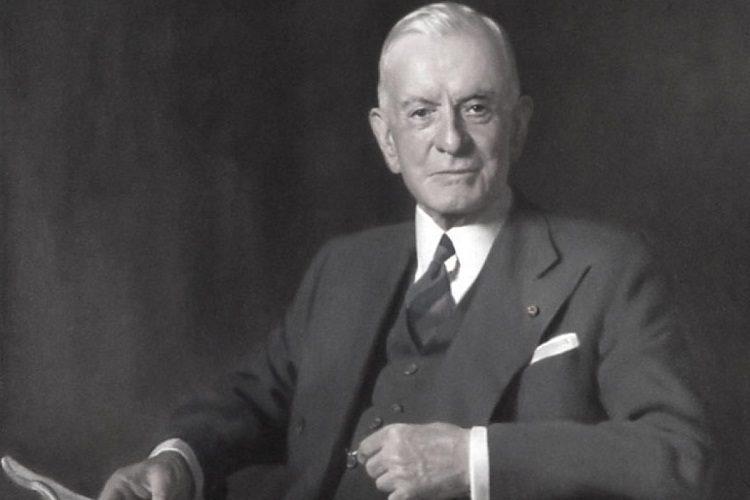No! Everyone who goes into business plans on becoming successful. So what makes one business successful and another unsuccessful? Is it lack of planning, lack of funds, bad decisions, bad timing, bad luck? While all of these can play a role, answering the question “What is success?” is the key to achieving it. We are going to explore the 8 common traits from some of the most successful business people in the world.
1. Thomas J. Watson: Be perseverant
Thomas J. Watson, the chairman and CEO of IBM from 1914 – 1956. He is the man credited with making IBM the company it is today. During his tenure, IBM became an international force. At the time of his death in 1956 he was known as the world’s greatest salesman. Despite what you see in movies, there are no “overnight success stories” in business. Failure is not only inevitable, it’s a critical step to achieving success. Failure lets you know what doesn’t work! And knowing what doesn’t work allows you to better evaluate and understand what does work. I used to own tanning salons, and in that industry, membership sales are key. Similar to gym memberships, customers pay a monthly fee for unlimited tanning. We also sold single tanning sessions, but I decided to price them high to encourage membership sales. We sold single tanning session at $15 and the monthly membership at $25. From my point of view, this was encouraging the sale of memberships (and a monthly income) over single sessions (and one time sales). What I didn’t take into consideration was that there was a high demand for short term tanning. Many people wanted to tan 2 or 3 times before an event, vacation, wedding, prom, etc… To these potential customers, I was clearly indicating that I did not want their business. I lost a lot of revenue to my competition because of it. But once I recognized this failure, I was able to adjust my pricing, single sessions went down to $9 each, and those short term tanners became a significant source of revenue for me. Failure is not an option in business, it is a requirement.
2. Steve Jobs: Stay curious and creative
Steve Jobs, a college dropout who was fired from his job at Apple Computer, a company he started with his friend Steve Wozniak. He went on to start a new computer company called NeXT which never really took off and ended up being acquired by Apple. By then, the company he had founded and was fired from was in complete crisis, many in the industry had already written off Apple as a lost cause. But Apple’s acquisition of Job’s failed NeXT computer provided him the opportunity to return to Apple becoming CEO. Under Steve’s demanding and intense leadership, Apple created some of the most iconic products ever made, including the iPod, iPad and iPhone. A company that was once on the brink of disaster was transformed into one of the most successful and well known companies in the world. In 2005 Jobs gave a commencement speech at Stanford University where reflected on being fired from Apple.
3. Jeff Bezos: Become an expert
Jeff Bezos, born in Albuquerque New Mexico to a teenage mother, he grew up in Houston with his mother and adopted father. After college, he worked various jobs including at a hedge fund where he became its fourth senior Vice President at the age of 30. That’s when he decided to quit and start selling books on-line.
4. Tim Cook: Focus on the customer
Steve Jobs left awfully big shoes to fill at Apple, but as Jobs’s hand picked successor, Tim Cook has risen to the challenge. What is success to Tim Cook? It is Apple’s expertise in developing products who’s form, style and function are so beautifully intertwined that they provide a unique experience for the user. Apple’s products are known for their meticulous design and attention to detail. In today’s highly competitive world, having expertise in a field will give you a significant advantage over the competition. Let’s face it, anyone can throw up a website and start selling things. In fact an entire industry. But make no mistake, being able to position yourself as an expert in a field significantly increases your credibility and can make you the “go to” person for your niche.
5. Richard Branson: Take risks
Richard Branson, founder of the Virgin Group which owns more than 400 companies, he was interested in business at a young age. At 16, he started a successful magazine called Student. He went on to start a mail order record company and later a chain of Virgin Record Stores (later called Virgin Megastores). His current ventures include Virgin Atlantic Airways, Virgin Mobile as well as a space tourism company called Virgin Galactic. A billionaire businessman and one of the wealthiest people in the UK, he is known for pushing boundaries and thinking outside the box. You don’t need to be an exceptional person to be successful, you just need to be willing to do things that other’s aren’t.
6. Bill Gates: Never be complacent
As the founder of Microsoft, Bill gates is consistently ranked as one of the world’s richest people. But even after founding one of the largest companies in the world, he still sees more opportunities and new frontiers. Never one to be satisfied, in 2017 the Arizona Republic reported that Gates had purchased nearly 25,000 acres of land in order to build a new “Smart City”.[1] With amenities like high speed public WiFi, self-driving cars and high-tech manufacturing facilities, he’s hoping that it will become the model for the future of urban planning. Bill is constantly looking for new ways to integrate technology into new markets. His response to people who wonder if he’s ever satisfied is:
7. Sandra Day O’Connor: Learn to delegate
The first woman to serve as a Supreme Court justice, Sandra Day O’Connor grew up on a ranch near Ducan Arizona. With no running water until she was seven, Sandra became a proficient horse rider and marks-woman, hunting rabbits for food. First appointed to the Supreme Court in 1981 by Ronald Reagan, in 2009 she was awarded the Presidential Medal of Freedom by President Barack Obama. The skill to delegate can be hard for the young entrepreneur who has built a business from the ground up. Giving up control to someone else is a very scary thought. But really, what is success in business? It’s having a business that growing. There’s an old saying that if you aren’t moving forward, you’re moving backward. In short, delegation is just relying on experts to do their jobs. I rely on experts for taxes, legal matters, website development, advertising and a whole host of other things that I’m not an expert in. The trick to delegation is to set clear goals and avoid the temptation to micro-manage the people you’ve put in charge. Learn more about delegation in this guide: How to Delegate Work (the Definitive Guide for Successful Leaders)
8. Oprah Winfrey: Think outside the box
Born in poverty to a teenage mother and molested as a child, Oprah Winfrey is a truly self made billionaire. Starting out as a talk show host, she quickly dominated the industry with The Oprah Winfrey Show shown in over 200 U.S. stations and over 100 countries. Following the success of her talk show, in 1999, she co-founded the Oxygen network which focused on internet and video content for women. In 2000 she started her highly successful magazine O The Oprah Magazine. In 2011 she started a television network called OWN (Oprah Winfrey Network) and in 2017 she sold a majority interest in it to the Discovery Channel for 70 million dollars. While Oprah Winfrey became a millionaire hosting the most successful talk show in history, what success is to Oprah is finding new ways to capitalize on her assets. She became a billionaire by branching out and finding new ways to market her brand. Starting, owning and running a successful business can be one of life’s most rewarding ventures. Providing both the personal and financial freedom to live life on your own terms, and with the advent of the internet, starting your own business has never been easier or cheaper. But the most important thing you can do is to define what success is to you. Does it mean being able to spend more time with friends and family without worrying about bills? Is it paying for the kid’s college education? Or to be able to travel the world with your spouse? Whatever it is, having a clear understanding of what success is to you will keep you motivated and focused through the inevitable ups and downs of entrepreneurship. Featured photo credit: Pexels via pexels.com







